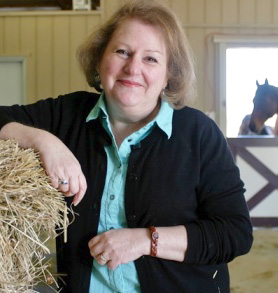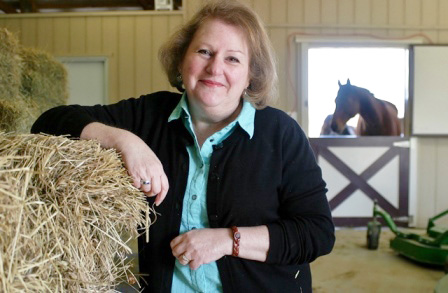Planning to medicate your horse? Deworm? Calculate feed? You absolutely need to know how much he or she weighs. But without a commercial scale, how do you do that? A weight tape provides an estimated weight, but for a closer approximation, Dr. Juliet Getty shares this handy formula for figuring your horse’s weight using a tape measure:
- Measure heart girth in inches (circumference of the horse’s body just behind the shoulder and at the middle of the withers, where the saddle girth would be)
- Measure length in inches—a straight line from the point of shoulder to the point of buttocks.
- Formula: Weight (in lbs) = (Girth X Girth X Length) divided by 330 (To obtain weight in kg, measure length and girth in cm. Use the above formula, except divide by 11,900, instead of 330.)
View diagram on page 168 of Dr. Getty’s comprehensive reference book, Feed Your Horse Like A Horse or on line at http://gettyequinenutrition.biz/Images/girthandlengthmeasurement.jpg[i]
Weight is not the only important diagnostic tool to measure your horse’s health. You’ll want to consider his Henneke body condition score, too; a horse can be of normal weight and still develop regional fat deposits along the crest of the neck, back, shoulder, and tail head, indicating insulin resistance. Along with other useful information about a horse’s “weighty matters,” instructions for using the Henneke system are on page 173 of Feed Your Horse Like a Horse. You can also view a helpful demonstration in this Purina video:
Monitoring your horse’s weight helps you know how well your weight loss plan is working. Keep in mind, however, that measurements tell you nothing about the source of weight loss. Your horse may be losing muscle instead of fat, especially if you are limiting his amount of forage intake. Conversely, horses fed forage free-choice will naturally produce more gas, creating a “hay belly;” the measurements will make it appear as though your horse is gaining weight, when in fact, it is gas that is causing abdominal distention. This is normal and healthy.
 Juliet M. Getty, Ph.D. is an independent equine nutritionist with a wide U.S. and international following. Her research-based approach optimizes equine health by aligning physiology and instincts with correct feeding and nutrition practices. Dr. Getty’s goal is to empower the horseperson with the confidence and knowledge to provide the best nutrition for his or her horse’s needs.
Juliet M. Getty, Ph.D. is an independent equine nutritionist with a wide U.S. and international following. Her research-based approach optimizes equine health by aligning physiology and instincts with correct feeding and nutrition practices. Dr. Getty’s goal is to empower the horseperson with the confidence and knowledge to provide the best nutrition for his or her horse’s needs.
Dr. Getty’s fundamental resource book, Feed Your Horse Like a Horse, is now in paperback as well as in hardcover, searchable CD and Kindle versions. All except the Kindle version are available at www.GettyEquineNutrition.com — buy the book there and have it inscribed by the author. Print and Kindle versions are also available at Amazon (www.Amazon.com); find print versions at other online retail bookstores. The seven individual volumes in Dr. Getty’s topic-centered “Spotlight on Equine Nutrition” series are available with special package pricing at her website, and also at Amazon in print and Kindle versions. Dr. Getty’s books make ideal gifts for equestrians!
Find a world of useful information for the horseperson at www.GettyEquineNutrition.com: Sign up for Dr. Getty’s informative, free e-newsletter, Forage for Thought; browse her library of reference articles; search her nutrition forum archives; and purchase recordings of her educational teleseminars. Find top-quality supplements, feeders, and other equine-related items, at her online Free Shipping Supplement Store[ii]. Reach Dr. Getty directly at [email protected].

Juliet M. Getty, Ph.D. is an independent equine nutritionist with a wide U.S. and international following. Her research-based approach optimizes equine health by aligning physiology and instincts with correct feeding and nutrition practices. Dr. Getty’s goal is to empower the horseperson with the confidence and knowledge to provide the best nutrition for his or her horse’s needs. Learn more at www.gettyequinenutrition.com.






